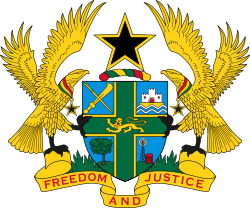 |
|---|
| Constitution |
| |
The Minister for Defence (Ghana) is the Ghanaian government official responsible for the Ministry of Defence of Ghana and the Ghana Armed Forces. The Minister for Defence from January 2025 until his death on 6th August 2025 was Dr. Edward Omane Boamah. He was appointed by President John Mahama at the start of his second stint as President of Ghana.